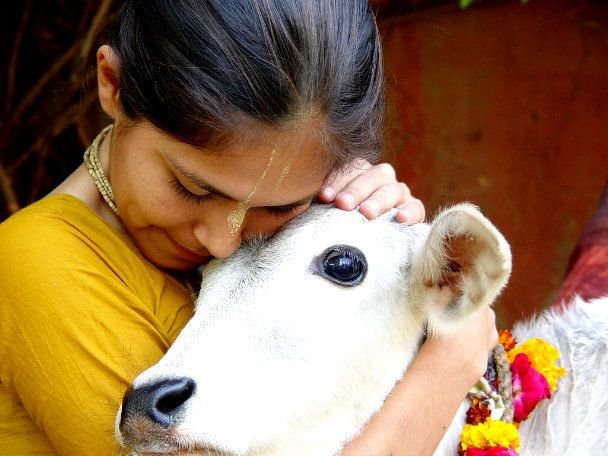why do Indians worship cows ?

The protection and veneration of cows by Hinduism is an abundantly established fact in India and everywhere in the world where Hindus live. The causative force most easily comprehended by people all over the world lies in the cow's nature of selfless beneficence and non-violence. The reverence of this useful domestic beast by Hindus is not confined to its preservation for merely its products. Instead, it extends to various practices found peculiar by non-Hindus, including abstinence from its killing for dietary or production purposes, and its worship as a universal mother and as Kamdhenu, a divine cow believed to grant all wishes.
Although the most widely assumed reason for the traditional uplift of this animal is the natural and indigenous respect among Hindus for all life on Earth and their religiously invoked vegetarianism, this is not entirely true. An ancient Hindu scripture concerning the "Laws of Man" states in a clear manner, "There is nothing sinful in eating meat but abstention is profusely rewarding," and yet, the Rigveda has shown and pointed cows as "un-slayable". Moreover, even while oxen, bulls and horses were sacrificed to God, and their meat eaten, the slaughter of cows was strictly prohibited. Even as of today, a majority of non-vegetarian Hindus abstains from consuming beef, or any products of cow-slaughter in general.
The best qualifying reasons, therefore, for the reverence of cows in Hinduism, are its overall usefulness, incredible nutritional and medicinal value of its products, and representation of absolute productivity and maternal selflessness. Hindus have eternally utilized every item that a cow produces with its intake of mere grass, grain and water, be it milk, urine or dung, along with its derivatives, not only in their regular lives for food, medicine, fuel and disinfection, which are all scientifically proven applications, but also in religious rites and festivals.
A highly encouraging factor in the adoration and respect of cows is its association with Lord Krishna, a popularly worshipped and adored Hindu God, who lived his young years as a cowherd. Additionally, a prominent old practice of gifting cows as charity to the Hindu priestly class, Brahmins, due to its golden value and productivity, inculcated a feeling among the people that killing a cow would be equivalent to killing a Brahmin, which was considered an unacceptable sin. Later, too, the Hindu rulers of princely states in India before and during the 20th century had prohibited the killing of cows in their provinces.
Many Hindus of Northern India unified in the late 19th century to stand for the preservation of cows and raised a movement that led to Hindu-Muslim riots, consequently leading to bitterness between the two sects. The subsequent result of this mixing of religious and political opinions was the division of the Indian subcontinent during its independence in 1947. In spite of the establishment of more than 3000 institutions, known as Gaushalas, all over India with the purpose of tending for old and sick cows, the general plight of cows in India is not appealing, with the poor animals living on the streets, living off garbage.
That is a good text. Unfortunately, you didn't write about half of it yourself. If you mark the quotations you use as such and indicate the respective sources, it is still a good text. And the best thing is: then it's no longer plagiarism!
Thanks for replying ,I will try to bring some more better content in future.